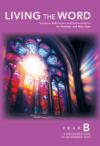Scripture Study for
Eighteenth Sunday in Ordinary Time
Ecclesiastes 1:2; 2:21–23 / Psalm 90:1 / Colossians 3:1–5, 9–11 / Luke 12:13–21
<< Back to LECTIONARY RESOURCES
Understanding the Word
By Br. John R. Barker, OFM
The Book of Ecclesiastes is an extended, sometimes agonized, exploration of the meaning of life, or—to be more exact—the question of whether there is a meaning to life. One fact that most troubles the author is the observation that very often those who do not work hard prosper, while those who do work hard do not. No one, no matter how hard they work, can be assured that their labor will pay off. This seems unjust, and the author questions whether there is in fact any justice built into God’s design of the world. If there isn’t, then what’s the point of trying? At least from the limited human perspective, everything is therefore “vanity,” a word that means “nothing,” “vapor,” or “pointless.”
Last week Paul noted that the Colossians had been buried and raised with Christ in baptism (2:12). The baptized now live a new life in Christ, having become part of his “body.” This life is “hidden,” in the sense that on the outside nothing about them has changed; this new life is only seen through the eyes of faith. It is nevertheless very real and is lived in and with Christ, who is associated with divine, not earthly, things. Those earthly aspects of the human person are opposed to God’s will and do not reflect the divine new life enjoyed by the baptized. This is the old self, who has died. The new self, the true self, lies hidden in Christ. Nevertheless, this new self must make itself known by how it acts in the world, transcending earthly divisions among humans.
Jesus’ response to the request that he intervene in a dispute between brothers has an edge to it. The address “friend” is, paradoxically, not particularly friendly and signals some disapproval, as does the refusal to intervene. Jesus will not be party to a dispute motivated at least partly by greed. The parable of the rich man illustrates the devastating spiritual impact that such greed can have. The language and decision of the man point to a single-minded self-centeredness regarding his good fortune: my harvest, my barns, my grain. He does not even seem to consider the possibility of sharing his overabundant harvest with those who are less fortunate. His enjoyment of and even obsession with his “goods” blind him to others. When his life is taken away from him, not only do the needy not profit from his abundance, but neither does he. Both his material goods and his spiritual welfare are lost because he was poor in what matters most to God.
